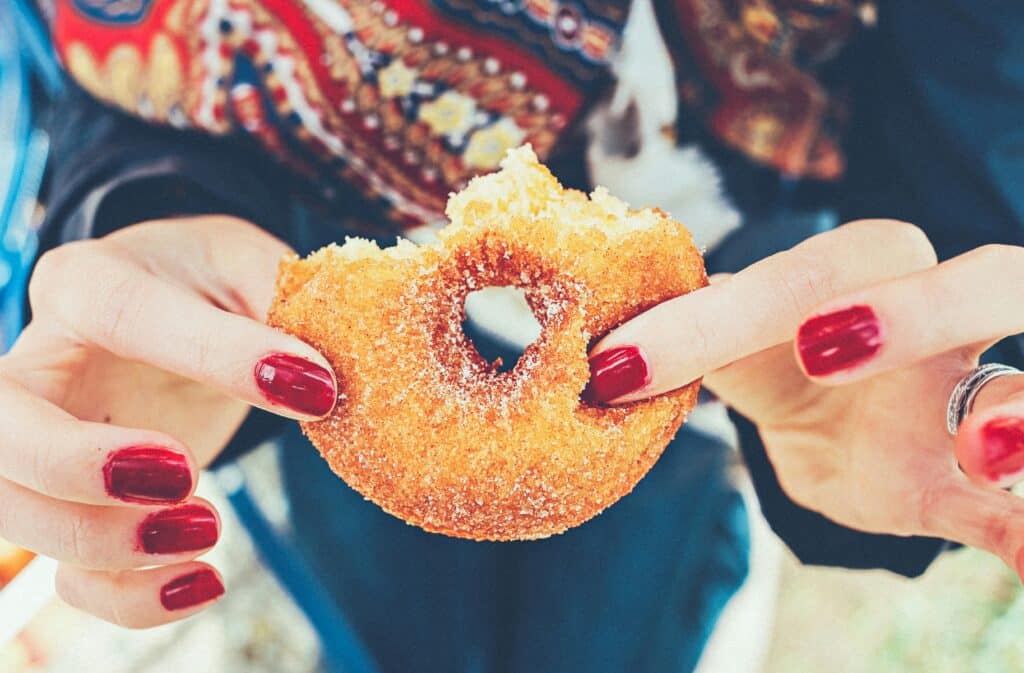
We’ve all faced food cravings at some point, and when they hit, resisting a sugary meal can seem like an impossible task. However, when you dig deeper, you can find the source of a constant craving and make the proper changes to minimize and eliminate them.
Table of Contents
Why do I have cravings?
Experiencing a craving is your body’s way of signaling its needs or that there are imbalances in your system. The most common causes for constant cravings are hormones and neurotransmitters. Although cravings can be a genuine signal that you need certain foods, they can also be fake with a different source of the problem.
We can categorize craving into four subgroups:
1. Nutrient deficiency
As the name suggests, a common cause of food cravings is the body’s need to correct nutrient deficiencies. For example, if you have a constant craving for red meat, you’re probably lacking iron in your system. Likewise, you’re most likely facing a calcium deficiency if you have a dairy craving.
2. Hormones
Hormones can be a massive trigger in food cravings. For example, menstrual cycles or pregnancy can lead to fluctuations in progesterone and estrogen, which are known for causing cravings. Furthermore, testosterone fluctuations can cause protein cravings, and cortisol spikes can cause sugar cravings and high-fat foods.
3. Emotional triggers
Your emotional state is another significant factor that decides whether you will have food cravings. Emotions like stress, anxiety, or even happiness can cause a craving for comfort foods as a way to cope or celebrate.
4. Medical conditions
As we mentioned in the previous groups, lacking certain nutrients and hormonal imbalances can cause constant cravings. In addition to that, certain medical conditions can have the same effects. For instance, if you have IBS (irritable bowel syndrome), your body will crave foods that will give it comfort. You may also have cravings as a side effect of taking certain medications.
Fake cravings
Actual cravings are a usual response from your body to fulfill its needs. However, there’s another category of cravings to look out for, which are the “fake cravings”:
1. Environmental cues
You can easily experience cravings from external factors, like seeing a commercial or passing by a fast-food restaurant. These cravings don’t come from genuine needs but because something from your environment triggered them.
2. Habits
Your daily routines and habits can also be the source of your constant craving. The most common one is having a sweet treat after a large meal. In that case, your body will start expecting it, which causes a craving even though you aren’t really hungry.
3. Psychological influences:
Your mind always seeks simulation; if you’re not providing it, it will try finding it by itself. Apart from fuel, food is also a stimulant, which is the perfect way for the brain to “entertain itself.” Hence, psychological factors, like boredom or a desire for distraction, can lead to fake cravings.
Different craving types

Cravings can come in different forms, and each one will signal what your body needs. By understanding them, you can adapt to each and manage them effectively.
What causes constant craving for sugar?
Craving for sugar is often triggered by rapid fluctuations in blood sugar levels, which urges the body to find a quick energy boost. Other factors, like stress eating and your environment, can also make you crave sugar as a form of emotional coping or psychological reward.
Your blood sugar levels may drop for a few different reasons, including:
- skipping your meals;
- high sugar intake (which will lead to a quick spike and then a quick drop);
- intense physical activity;
- medication side effects;
- health conditions.
If one of these happens, sugar cravings are the natural body’s response.
Another factor that can cause sugar cravings is nutrient deficiencies, particularly chromium or magnesium. Both of these nutrients are connected with your insulin levels, which regulate your blood sugar levels.
Furthermore, your emotional state can urge you to eat comfort foods, usually high in sugar. Comfort foods will trigger your brain’s reward system and stimulate it to release dopamine (the happy hormone), making you feel better.
What does it mean when you crave salty foods?
Craving salty foods can happen due to an electrolyte imbalance or mineral deficiency (particularly in sodium, potassium, or other essential electrolytes). Furthermore, craving salty foods can also occur because of stress, dehydration, or adrenal fatigue.
Electrolytes like sodium and potassium maintain the proper fluid balance in your body and nerve function. When there’s an imbalance, your body will start craving salty foods as a natural response to restore those levels.
Similarly, mineral deficiency (especially zinc and magnesium) will cause salty food cravings to solve nutrient deficiencies. These minerals are crucial for many physiological functions, and their replenishment is paramount.
Craving salty foods can also be a disguised signal for thirst. Hence, before reaching for a snack, try drinking a glass of water and see if the cravings pass.
Finally, chronic stress or adrenal fatigue can contribute to salt cravings, as the adrenal glands play a role in sodium regulation.
Practical tips to reduce constant craving
Now that we’ve covered the sources and the most common craving types, let’s dive into actionable tips you can use to prevent your cravings.
Tip 1 – Stop eating junk food
Gradually replace junk food with nutrient-dense alternatives. For example, swap sugary snacks with fresh fruits or processed chips with whole-grain alternatives. A healthy food delivery service can be your helping hand in these efforts, as you’ll always have access to nutritious options.
Tip 2 – Stay hydrated
Thirst can sometimes be mistaken for hunger, causing constant craving. Hence, ensure you’re always properly hydrated.
Tip 3 – Regular exercise
Add exercise to your routine to regulate your appetite and reduce stress levels. These feelings will significantly help with minimizing cravings.
Tip 4 – Proper sleep
Aim for 7-9 hours of quality sleep each night to support hormonal balance and decrease cravings, particularly for high-calorie foods.
Tip 5 – Identify triggers with journaling:
You can keep a food journal to find patterns and triggers for cravings. Knowing what causes them will make it much easier to solve the issue.
Final thoughts
There are quite a few factors that can cause constant cravings, and understanding them is vital for minimizing these feelings. However, even if you’re unsure of their source, making positive lifestyle changes like improving your diet and regular exercise will still greatly help.
Embrace these strategies as tools to decode and conquer your cravings, forging a path towards a healthier life.

